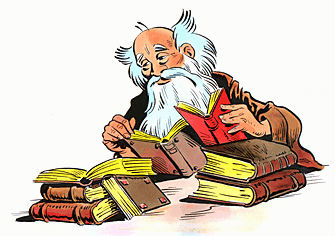Biblio Words: “biblioklptomaniac” to “unbiblical”,
Part 3 of 3.
Words that include: biblio-, bibli-, bibl-
(Greek: book)
bibliokleptomaniac:
A book thief who is often regarded as insane.
bibliolater, bibliolatrist:
Someone who has an excessive admiration or reverence for a book or books.
bibliolatrous:
Characterized by bibliolatry.
bibliolatry:
1. Extravagant admiration of a book or of books in general.
2. Excessive reverence for the mere letter of the Bible.
bibliologist:
A professed student of bibliology.
bibliology:
1. Scientific description of books, book-lore; bibliography.
2. Biblical literature, doctrine, or theology.
3. The study of the doctrines of the Bible.
bibliomancy:
A form of divination (fortune telling) using books, especially the Bible, in which passages are chosen at random and the future foretold from them.
bibliomania, bibliomane, bibliomanism, bibliomanical:
An intense desire to collect and possess books, especially rare and curious ones; “crazy” about books.

bibliomaniac:
Someone who has an intense desire to collect and possess books.
biblion, singular biblia, plural:
Book, books.
bibliopegic:
Of or pertaining to bookbinding.
bibliopegist:
A bookbinder.
bibliopegy, bibliopegia:
Bookbinding as a fine art.
bibliophage:
Devouring books; a bookworm (literally, “bookeater”).

bibliophagist:
One who devours (ardently reads) books.
Bookworms are literally the larvae or adults of various insects, moths, and beetles that live in and feed upon the pages and bindings of books. No single species can properly be called the bookworm, but the little beetle anolium, silverfishes and book lice are widely known by the name.
The human equivalent of the "bookworm species" also lives in and feeds upon the pages of books, but usually doesn’t destroy them. Human bookworms have been scorned from Elizabethan times to the present and few scriveners have had anything good to say about them.
—Encyclopedia of Word and Phrase Origins by Robert Hendrickson
(New York: Facts On File, Inc., 1997), p. 90.
bibliophagy, bibliophagous:
The consumption or devourer of books.
bibliophile, bibliophil, bibliophilic:
A lover of books; a book fancier.
bibliophilism:
The principles and practice of a bibliophile.
bibliophilist, bibliophilistic:
Someone who is a lover of books.
bibliophily:
A love of books or a strong taste for books.
bibliophobe:
Someone who has a dread or hatred of books; an abnormal dislike of books.
bibliophobia:
A dread of, or aversion to, books.
bibliopoesy:
The making of books.
bibliopolar, bibliopolic, bibliopolical:
Of or belonging to booksellers.
bibliopole:
A dealer of books, a bookseller; especially one who deals in secondhand and rare books..
bibliopolism:
The principles or trade of bookselling.
bibliopolist:
A bookseller.
bibliopoly, bibliopolery:
The selling of books, bookselling.
bibliosoph:
One who knows or knows about books.
bibliotaphist:
One who keeps books under lock and key.
bibliotaphy; bibliotaph, bibliotaphic:
The hoarding or hiding of books, often under lock and key.
bibliotheca:
1. The Scriptures, the Bible.
2. A collection of books or treatises, a library.
3. A bibliographer’s catalogue.
bibliothecal:
Belonging to a library.
bibliothecary, bibliothecarial, bibliothecarian:
1. A library.
2. A librarian.
3. Of or belonging to a library or librarian.
bibliotherapist:
A therapist who utilizes reading as part of his/her treatment.
bibliotherapy, bibliotherapeutic:
1. A nonphysical, psychotherapeutic technique in which the patient is induced to read books. It is used in treating mental illness.
2. Utilization of reading as an adjunct to psychotherapy. The reading matter recommended must be selected individually for the specific patient, depending on the goals of therapy, the intellectual capacities of the patient, and his/her stage of achievement in therapy.
3. The therapeutic use of reading material in the treatment of nervous diseases.
bibliothetic:
Relating to the placing and arrangement of books on the shelves of a library.
bibliotiks:
Analysis of handwriting, documents, and books; especially, for authentication of authorship.
bibliotist:
One who is a specialist in the analysis of handwriting, documents, and books; especially, for authentication of authorship.
Biblism:
Adherence to the Bible as the sole rule of faith.
Biblist:
1. One who makes the Bible the sole rule of faith.
2. A biblical student.
biobibliographical:
Dealing with the life and writings of an author.
biobibliography:
A bibliography containing biographical information about the author or authors.
gymnobiblism, gymnobiblical:
The opinion that the bare text of the Bible, without note or comment, may be safely put before the unlearned as a sufficient guide to religious truth.
gymnobiblist:
A believer in gymnobiblism.
philobiblic, philobiblian:
Fond of books; devoted to literature.
philobiblist:
A lover of books.
philobiblical:
Devoted to the study of the Bible.
photobibliography:
Description of books with the aid of photography.
solibiblical, solibiblicism:
That which relies or depends on the Bible only.
solibiblist:
Someone who depends only upon the Bible for truth and guidance.
unbiblical:
1. That which is not biblical.
2. Out of harmony with the Bible.